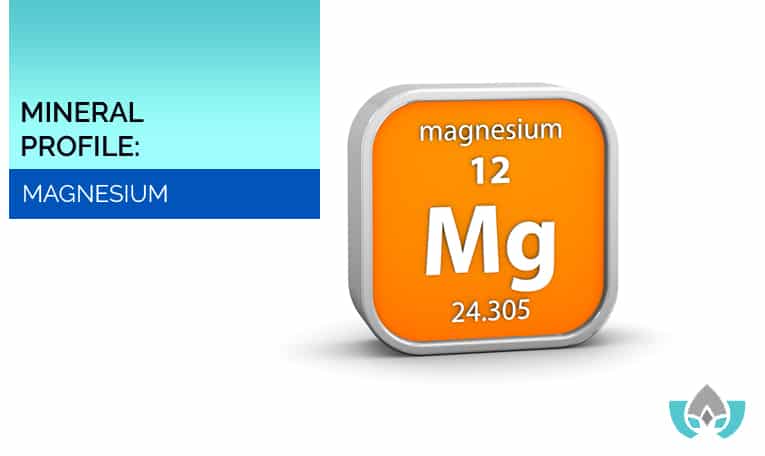
When it comes to vitamins and minerals, the abundance of information and advice available can be confusing.
Most people know vitamin C is good for immune health, and many people have some idea that iron is important for blood.
But there are so many more which most of us don’t think about.
As a naturopathic doctor in Mississauga, I want to help you understand more about various vitamins and minerals which you may not give much thought to.
Today we will have a closer look at magnesium – its benefits, dietary sources, and the risks of too much or not enough.
Keep reading to learn more about this important nutrient.
What Is Magnesium?
Magnesium is a mineral which is involved in over 300 reactions within the body.
It plays important roles in regulating blood pressure, assists with nerve and muscle function, and offers immune system support.
About half of all magnesium in an adult human body is stored in the bones, while the rest can be found in soft tissue, muscles, and bodily fluids.
Health Benefits Of Magnesium
Getting enough magnesium has important effects on health.
In this section we’ll have a closer look at some of the benefits of this important mineral.
1. It’s Good For Your Bones
Most people are aware that getting enough calcium and vitamin D is important for bone health, but magnesium also plays an important role in healthy bone development.
It’s been linked to lower risks of osteoporosis, improved bone formation, and higher bone density, which reduces risk of broken bones.
Not only does magnesium directly impact bone health, but it also plays a part in regulating levels of calcium and vitamin D.
2. It’s Good For Your Heart
Magnesium plays an important role in muscle health, and this includes heart health.
It has been found magnesium intake can lower the risk of stroke, and giving it to people who have suffered a heart attack may reduce the risk of mortality.
Given to individuals with congestive heart failure, magnesium can help lower the chances of abnormal heart rhythms.
There may be evidence to suggest magnesium may also help prevent high blood pressure, however the effect of this is small and needs to be studied further.
3. It May Relieve The Symptoms Of PMS
PMS symptoms can be very unpleasant, and include mood swings, bloating, headaches, and tiredness.
There are some studies which suggest a combination of magnesium and vitamin B6 could be used to improve these symptoms.
Additionally, the American College of Obstetricians and Gynecologists says it might be useful for lessening some symptoms, including bloating and breast tenderness.
More studies are needed to confirm these effects.
4. It Lowers Your Risk Of Type 2 Diabetes
Magnesium is involved in the regulation of glucose and metabolism of insulin.
A large number of people with diabetes have also been found to have low magnesium levels.
There have been studies which suggest supplementation with magnesium can improve insulin sensitivity; however, more evidence is needed in order to suggest this as a possible method of controlling type 2 diabetes.
5. It May Help Reduce Anxiety
Mood disorders such as depression and anxiety may be linked to magnesium levels.
Low magnesium has been linked to increased anxiety, and may affect glands which control stress levels.
Further study is needed, however, to determine the role supplementation with magnesium may have in anxiety reduction.

Dietary Sources Of Magnesium
Magnesium can be found in a wide variety of foods and should be easy to get through diet.
Some dietary sources of magnesium include:
- Bananas
- Nuts, including almonds, oil roasted peanuts, and roasted cashews
- Oatmeal
- Canned kidney beans
- Avocado
- Potato with skin
- Soy milk
- Spinach
- Cooked black beans
- Cooked edamame
- Cooked brown rice
- Whole wheat bread
- Beets
Symptoms Of Magnesium Deficiency
Although it’s fairly common for people to not get enough magnesium in their diets, symptoms of deficiency are rare in otherwise healthy individuals.
It can occur as a side effect of some medications or health conditions, or due to excess intake of alcohol.
Not enough magnesium can look like:
- Nausea and vomiting
- Low appetite
- Tiredness
- Weakness
Advanced magnesium deficiency may include:
- Changes to heart rhythm
- Muscle cramps
- Seizures
- Changes in personality
- Numbness and tingling
Symptoms Of Magnesium Toxicity
Although there are risks associated with not getting enough magnesium, there are also issues which can arise if you get too much.
Magnesium toxicity through diet is unlikely, as the body will eliminate the excess through the urinary tract.
However, if you are using magnesium supplements, some side effects can include gastrointestinal issues, including cramping, nausea, and diarrhea.
Extremely high doses can lead to issues such as:
- Low blood pressure
- Urine retention
- Kidney issues
- Depression
- Lack of energy
- Vomiting and nausea
- Loss of nervous system control
- Cardiac arrest
- Death
Should You Take Magnesium Supplements?
It is ideal to get vitamins, minerals, and other nutrients through diet rather than supplementation.
This is because they tend to work in synergy with each other, and more benefits come from having them together rather than on their own.
If you are worried you aren’t able to meet your magnesium needs through diet, or may be at risk of deficiency, it’s best to discuss the use of supplements with your doctor or naturopath.
Book Your Appointment With The Mindful Healing Clinic
Are you worried you aren’t getting enough magnesium in your diet?
Perhaps you have a health condition which puts you at risk for magnesium deficiency.
Maybe you just want to review your diet to ensure you’re getting all of the vitamins and minerals you need.
The Mindful Healing Clinic is here to help.
Dr. Maria will work with you to identify any nutritional deficiencies you may have and create a plan to fill any nutritional gaps she may find.
Contact us today for a consultation or to set up an appointment.
Until next time,
Dr. Maria Cavallazzi, N.D
Mindful Healing Naturopathic Clinic
Mississauga, ON L5M 1L7
(905) 819-8200
► https://g.page/MindfulClinicNaturopathic
Dr. Maria Cavallazzi is a medical doctor from Colombia where she practiced as a family physician for 8 years until she moved to Canada 16 years ago and became a naturopathic doctor in Mississauga.


